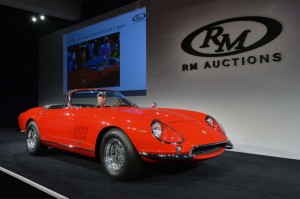
At $27.5 mil - including fees - the 1967 NART Spyder was the most expensive Ferrari ever auctioned off. Photo Courtesy Drew Phillips, Autoblog.com.
If you think Wall Street traders have been running up stock prices faster than justified you just might be in for a shock when you check out the results of the half dozen major car auctions that were heading for an all-time record after the classic car weekend in tony Pebble Beach, California drew to a close Sunday night.
Preliminary estimates suggest RM, Gooding’s and the other auctions were likely to boost last year’s strong numbers by almost a quarter – with the gavel coming down time and again on bids that handily topped the million dollar mark. That notably included a near-record $25 million paid for a 1967 Ferrari 275 GTB/4 NART Spyder.
Adding in the auction house fee, the final price came to $27.5 million for the Ferrari, one of only 10 ever built for the North American Racing Team. The car had a more than passing role in the 1968 film, The Thomas Crown Affair, and star Steve McQueen owned – and eventually wrecked – his own NART.
The winning bidder was Canadian entrepreneur Lawrence Stroll, a co-founder of the Tommy Hilfiger clothing line. The seller has indicated he’ll be donating the entire proceeds to charity. The final price came in just below the $29.7 million record for a 1954 Mercedes-Benz race car once driven by Juan Manuel Fangio. But it handily exceeded the record $16.4 million – including commission – paid for a 1957 Testa Rossa two years ago, until then a record for a Ferrari.
While the Ferrari might have narrowly missed setting a new record, all indications suggest the long weekend in Pebble Beach – home to an assortment of classic car shows that draw some of the world’s wealthiest and most enthusiastic collectors – was on its way to beating the previous auction peak.
An early forecast by Hagerty Insurance suggested that the various auctions ultimately would net about $325 million, which would be a 22% jump from last year.
(Crawling through Motown in the Woodward Dream Cruise. Click Here for the story.)
Buyers were clearly in a mood to spend – big. The NART, for example, was expected to draw between $14 million and $17 million and even the most optimistic observers hadn’t seen it likely to go much above $20 million.
But things got off to a fast start on Friday when Hagerty observers tallied $86.2 million in purchases across the various auctions linked to the weekend’s big event the annual Pebble Beach Concours d’Elegance. Some of the bigger bids were gaveled down for prior winners of the Concours which is generally considered the most prestigious classic car show in the world.
The various auction houses offered a wide range of vehicles, some commanding relatively affordable prices in the mid to high four-figure range. But Gooding was anticipated to get $1 million or more for at least 37 of the 160 vehicles it planned to drive across the auction block on Saturday and Sunday.
Rival RM took a winning bid of $9.08 million for another rare Ferrari, a 1953 375 MM Spyder that was just one of 12 ever built. It had been in the hands of one owner for the last 45 years.
The surge in bidding this year has raised plenty of questions about where all the money has been coming from. Clearly, some cash is coming in from markets overseas where a new crop of collectors hope to grab true treasures away from the normal click of auction house regulars.
But there’s also concern that the frenzy could be driven, at least in part by speculators who are simply looking to make a quick killing in the classic market and get out again. Indeed, a number of top-dollar models have been to auction twice or even more often in recent years. The fear is that such rapid price inflation could create a bubble that will eventually burst and hurt the entire market, several observers told TheDetroitBureau.com.
That has happened several times since the 1990s – though as the latest upturn shows, true rarities eventually regain their momentum in the collector car market.


People always pay absurd prices for “movie cars”. The fact that this ferrari is a movie car, a race car and one of only ten ever made all drives the price out of sight.
BTW, those of means do not know anything about the economic recession as it doesn’t have any significant impact on their lives. For them money is just a means of keeping score.